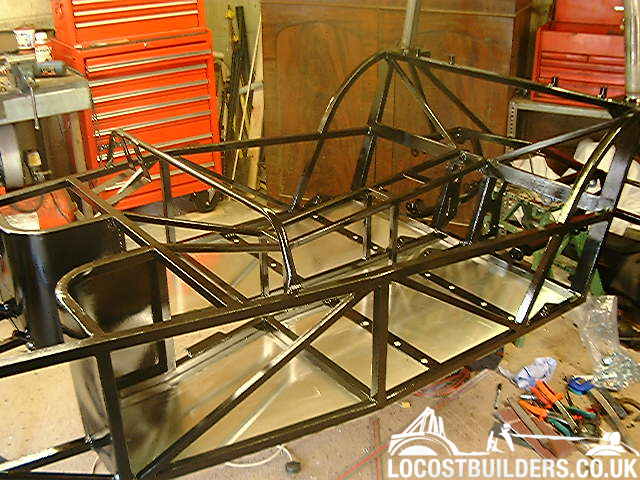
[Edited on 9/10/19 by nick205]

So first of all, I have done a search on this and the views do seem to vary widely.
I'm about to pull the trigger on an MK Indy RX5 and I'm questioning whether to use steel or aluminium for the floor. On my searches, it
seems the conventional wisdom on floor choice is between 2mm Aluminium sheet bonded and riveted in or 18ga steel sheet welded in.
Now I'm probably overthinking this but as far as the bonding goes for aluminium, doesn't this just bond to the powder coat and not the
actual steel chassis thus making the bond only as strong as the powder coat? I understand the rivets will provide some structural support but the
concern with rivets is always any flex opening up the rivet holes and reducing the effectiveness of those rivets.
Can someone tell me I'm being stupid and just go bonded aluminium?
When I built my MK Indy I used 2mm Aluminium sheet for the floor. I rivetted it to the chassis rails and then ran black sealant around on the inside
edges between the black (painted) chassis rails and unpainted Aluminium floor. I never even considered steel floor, doesn't seem sorth it to me
for the rust potential and additional welding required to fit it that way.

[Edited on 9/10/19 by nick205]
Yes, the bonding is only as good as the powder coat. Mine is just riveted on, with silicone sealant between to seal and 30,000+miles later I've still not landed on my arse. I have replaced a few of rivets (maybe one per year) that I've spotted missing (heads come off) when doing checks.
Several thousand locosts with bonded-on-paint floors can't be wrong... Although I did have the same thought, and I've not actually painted
the underneath of the chassis!! I'll be doing bond and rivet all round.
The other aspect is the 'dink donk' factor... when you tread on a steel floor you can hear it distort. Aluminium doesn't (well, I
don't think it does!).
3mm alloy will be just fine, I'd use tiger seal to bond it on and it won't be going anywhere. My JBA had a bonded on plywood floor and even after a huge crash was totally undamaged.
Thanks for the replies guys. Aluminium seems to be the way to go.
I've only had an Aluminium floor and it certainly didn't make any "dink-donk" noise when standing on it getting in/out of the car.
I've read on here that steel floors are prone to the "dink-donk" noise when standing on them though.
I have a steel floor and it is solid but does the dink done thing. And it is flipping loud. DINK DONK!
Mine has a 3 mm checkered plate Ali floor, riveted with aboud 120 rivets per side (Pilot/passenger) and PU Adhesive for sealinmg.
I dont see the bond failing... As most of the forces will be taken by the rivets.
It was bonded to epoxy primer and alkyd painted rails.
I reckon Ali Thickness, rivet spacing and Sealant used were overkill, but hey ho... I designed/devised the system a long time before I knew how to
build a car... (Not that I do now  )
)
One good reason to do rivets and sealant is that you can rest assured that no moisture enters the rails through the rivet holes...
On the flip side, if water has another point of entry it won´t escape either...
HTH
On my build I used closed end pop rivets. I took the view that if the rivets were closed end then moisture couldn't get through the rivet centre hole inside the chassis rails. The closed end rivets weren't any more expensive than open end ones so it didn't up the build cost eiher.
quote:
Originally posted by nick205
I've only had an Aluminium floor and it certainly didn't make any "dink-donk" noise when standing on it getting in/out of the car.
I've read on here that steel floors are prone to the "dink-donk" noise when standing on them though.

I went with steel for two reasons:
1. The previous owner welded the steel floor on
2. I'm too lazy to cut it off and replace with alloy sheet